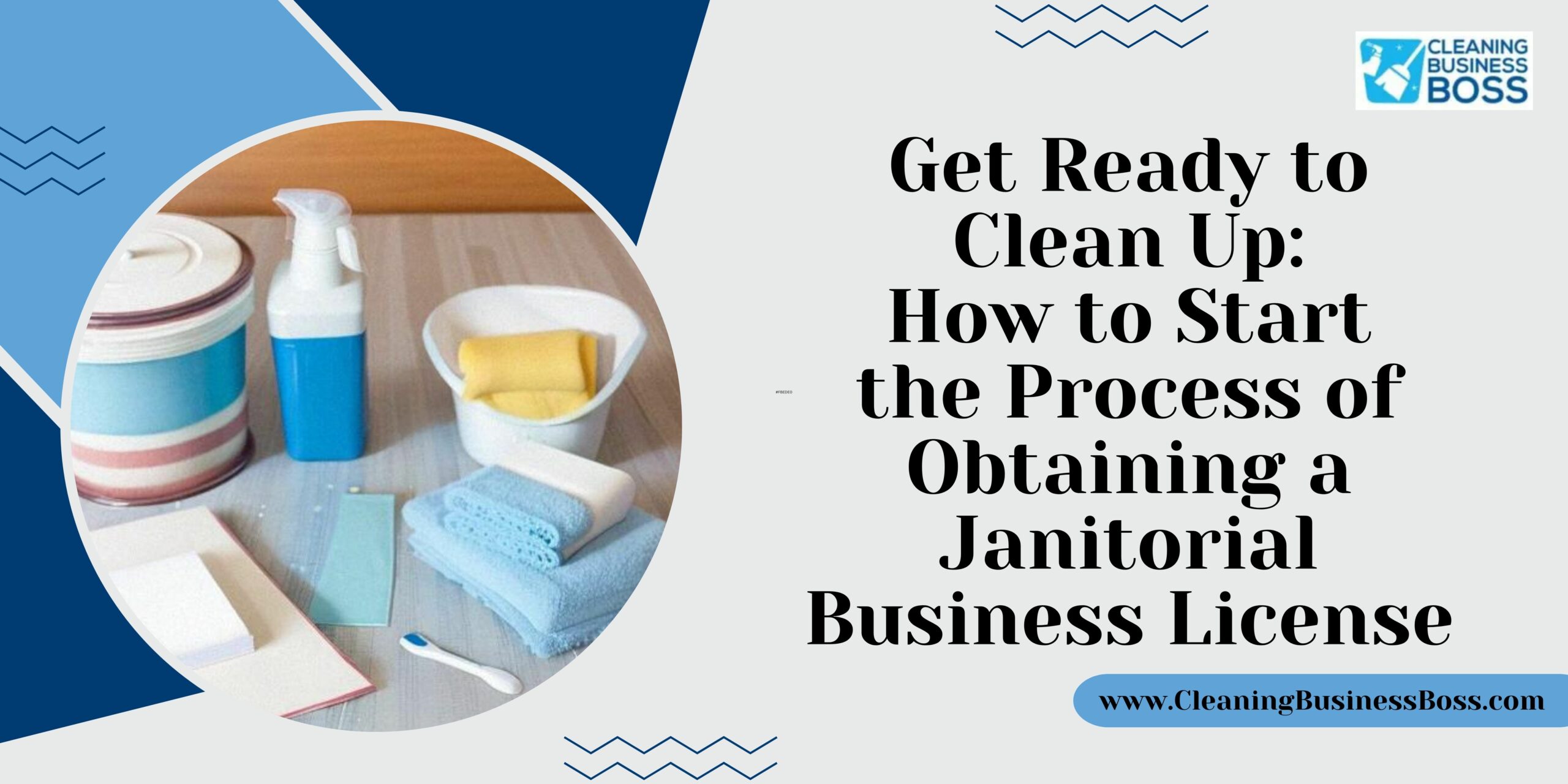Establishing a janitorial service from the ground up involves extensive prior planning and preparation, in addition to strict adherence to applicable regulatory standards. Getting a license to run a janitorial business is an important step in the process.
To effectively start the process of obtaining a janitorial business license, you should begin by contacting your city or county business licensing office, gathering the required information, such as an EIN or SSN for tax identification, submitting the application form and fees, and waiting for license approval.
This article will provide a step-by-step guide for beginning the process of acquiring a janitorial business license. By adhering to these guidelines, you can ensure a straightforward and fruitful journey toward establishing your cleaning service.
Contact Your City or County Business Licensing Office
The first step in the process of getting a cleaning business license is to get in touch with your local municipal or county business licensing agency. This important office is tasked with supervising and granting permits to companies doing business under its purview. By starting a conversation with them, you unlock a plethora of useful information that will help you navigate the process.
Your main source of advice and support when it comes to comprehending the standards and particular requirements for obtaining a cleaning company license in your area is the municipal or county business licensing office. They have in-depth knowledge of the rules that apply to businesses much like yours in the area, ensuring that all laws are followed. You must become familiar with these rules because they can differ depending on where you are.
When you get in touch with the business licensing office, they will give you comprehensive information about the procedures and paperwork needed to acquire a janitorial company license. They can answer any queries you may have, describe certain rules, and offer advice relevant to your jurisdiction. You can grasp what is required of you as you move through the licensing process thanks to this initial communication.
The business licensing office can also give you crucial information about any additional licenses, credentials, or permissions that might be required for your janitorial service. They might provide you with information on specific training courses or certifications that would improve your knowledge of the subject and increase your chances of getting a license. Making this early link guarantees that you are knowledgeable and prepared to comply with any legal obligations in your jurisdiction.
Keep in mind that each city or county has its own particular set of rules, and adhering to them is essential to the growth of your janitorial service. You show your dedication to abiding by the law by contacting your neighborhood business licensing office. This first step not only lays the groundwork for a simple licensing procedure but also forges a connection with the office that will help you throughout your business.
Gather the Required Information

You will start the critical period of assembling the relevant data and supporting documentation for your janitorial business license application after getting in touch with the business licensing office. Your jurisdiction’s unique requirements will be fully disclosed to you by the licensing agency, ensuring that you are adequately prepared to meet all regulations.
The giving of your Social Security Number (SSN) or Employee Identification Number (EIN) for tax identification reasons is one of the most typical requirements. While the SSN is a nine-digit number given to people for a variety of reasons, including tax identification, the EIN is a distinctive nine-digit number given to corporations by the Internal Revenue Service (IRS). These figures are essential for verifying the validity of your company and guaranteeing correct tax compliance. To speed up the application process, it is imperative to have these numbers on hand.
You can be asked to present personal identification credentials like a driver’s license, passport, or state identification card in addition to your tax identification. These papers demonstrate your identity and confirm that you are qualified to apply for a janitorial business license.
The licensing office could ask for proof of residency, like utility bills or lease agreements, to ensure that you are conducting business within their legal boundaries. This criterion makes sure that your company complies with local laws and works within the proper limitations.
You might also be required to give any pertinent credentials or qualifications relating to the janitorial sector, depending on your area and the specific legislation in place. This could include proof of your completion of training programs, memberships in professional organizations, or specialist certificates that show your know-how and dedication to excellence in the industry. These extra credentials can strengthen the reputation of your janitorial company and improve your chances of getting a license.
Before submitting your application, it is essential to carefully check the list of details and supporting papers that the licensing office has provided and make sure you have gathered all of them. Being organized and well-prepared shows that you are professional and committed to the licensing procedure, which can help your application’s outcome.
Submit the Application Form and Fees
The next step is to fill out the application form once you have acquired all the information required for your cleaning company license application. This form is a vital record that gives the licensing office valuable information about your company. It usually has parts where you must supply correct and legible information, making sure there are no mistakes or discrepancies that can slow down the review process or cause other issues.
Typically, the application form will request information about your company, including your janitorial company’s name, address, and contact data. To guarantee that the license is provided with proper details, it is crucial to provide this information accurately. Checking the form again for mistakes or missing data will help you prevent unneeded delays.
You could be required to provide ownership information on the application form in addition to basic business information. You might do this by stating whether you operate as a company, partnership, or sole owner. Giving the licensing office precise information can aid in determining the best legal framework for your company.
You must submit the required fees, as stipulated by the licensing office, with the completed application form. Depending on the jurisdiction and the kind of janitorial service you plan to run, these fees may change. You will receive detailed instructions on how to make the payment from the licensing office. This could entail paying fees in person at their office, sending a check or money order, or using online payment alternatives. To ensure that your payment is handled and without any problems, it is essential to carefully adhere to the directions given by the licensing office.
The licensing office may additionally request that you provide supporting papers with your application form and fees. These documents can be identification evidence, records of a company’s incorporation, completion certificates for any necessary training courses, or any other records required by the laws of your country. To prevent delays in the processing of your application, it is crucial to include all needed supporting evidence.
Fulfill Local Bond and Insurance Requirements

Many jurisdictions require janitorial services to obtain local bonds and insurance coverage to protect the safety and security of both your clients and your janitorial business. These actions serve as crucial safeguards, offering safety in the case of unforeseen events or incidents.
The local bond, a type of financial guarantee, is an essential component. The bond acts as a safety net for clients who might suffer harm or negligence brought on by your janitorial service. The bond might offer money as compensation if a customer makes a claim against your company for such problems. It serves as a safety net, assuring customers that they will be adequately reimbursed if any harm is brought on by your company’s operations.
Insurance coverage is another important consideration. Janitorial companies are subject to a variety of dangers, such as accidents, property damage, and potential legal action. Your company and employees are shielded against these dangers by insurance coverage. It often consists of property insurance, general liability insurance, and insurance for workers’ compensation. The third-party claims resulting from mishaps or injuries sustained while conducting business are covered by general liability insurance. Workers’ compensation insurance offers protection for staff members who might get sick or hurt while performing their jobs. Your company’s inventory, equipment, and other assets are protected by property insurance from theft, fire, vandalism, and other insured perils. Having the right insurance coverage guarantees that your company is ready to face unforeseen circumstances and can reduce financial risks.
The licensing office will inform you of the exact requirements for bonds and insurance coverage. They will advise you of the necessary bond types, minimum coverage amounts, and any particular insurance companies that have been authorized by the relevant authority. To guarantee that your company is appropriately protected and working in complete conformity with local rules, you must adhere to these standards. Failure to comply with these regulations may result in fines, license revocation, or legal responsibilities, all of which may hurt your janitorial company’s ability to continue operating.
You demonstrate your dedication to professionalism, accountability, and the welfare of your clients and workers by getting the necessary bonds and insurance coverage. It demonstrates your commitment to running a law-abiding and reliable janitorial company. Having these safeguards in place can also improve your reputation, inspire confidence in potential customers, and give you a competitive edge in the market.
Wait for License Approval

Your application will begin the review process at the licensing office once you have finished filling out and submitting it, paid the necessary costs, and satisfied any additional requirements like bonds and insurance. Patience is needed during this phase as the licensing office carefully examines each application to make sure that all requirements are met.
The licensing office will carefully scrutinize every aspect of your application throughout the review phase, which could take some time. They will ensure that the information is accurate, that all necessary paperwork has been completed, and that you adhere to the particular rules and laws established by the jurisdiction.
It is crucial to exercise patience during this time and hold off asking the licensing office about the progress of your application unless they directly tell you to. However, it is essential to respond quickly to the licensing office’s requests for clarification or further information. This can entail supplying more supporting documents, responding to specific inquiries, or clearing up any conflicts that might appear during the review procedure.
To safeguard the integrity of the licensing system, keep in mind that the licensing office strives to evaluate each application thoroughly. You can speed up the review process and show that you’re committed to compliance by being helpful and responsive.
The length of time needed for evaluation will ultimately rely on several variables, including the intricacy of your application and the workload of the licensing office. It is wise to plan for the review procedure to take a few weeks to a few months. During this phase of the application procedure, patience and readiness are crucial.
Additional Information: Local Requirements May Vary
It is important to stress that different jurisdictions may have different local regulations for acquiring a janitorial company license. This page offers a general overview to aid in your comprehension of the process’ typical steps. To get accurate and current information on the particular regulations in your area, you must speak with your local company licensing office. By doing this, you can make sure you are fully compliant with all laws and regulations and improve your chances of acquiring a janitorial company license.
Frequently Asked Questions
How do I know which one I need to apply for a cleaning business license? What’s the difference between an EIN and an SSN?
For tax identification, businesses are given a unique nine-digit number called an EIN (Employee Identification Number) by the Internal Revenue Service (IRS). The SSN (Social Security Number), on the other hand, is a nine-digit number that is given to people for a variety of reasons, including tax identification.
An SSN is typically not sufficient to obtain a janitorial business license; an EIN is required instead. While an SSN is generally used for personal identification, the EIN is created exclusively for commercial companies. To validate the particular specifications for your region and make sure you have the right identification number for your license application, get in touch with your city or county’s office of business licensing.
What credentials or certifications are necessary to obtain a janitorial business license?
Depending on your jurisdiction, the particular credentials needed to apply for a janitorial company license may change. While some regions might not have severe certification criteria, others might have particular standards to guarantee the janitorial industry’s professionalism and quality.
To find out if any mandatory certificates or credentials are required for your janitorial business license, it is essential to contact your local office of business licensing. They will give you the necessary information and advice regarding any training courses or certificates that might improve the legitimacy of your company and raise your chances of getting a license.
How long does it usually take for a janitorial company license to be approved?
Several variables, such as the effectiveness of the licensing office and the intricacy of your application, might affect how long it takes to approve a janitorial business license.
The evaluation procedure could often take a few weeks to a few months. The licensing office will review your application, confirm the data you supplied, and make sure you satisfy all requirements during this period. It is crucial to exercise patience during this time and be ready to answer any questions or requests for further documents from the licensing office right away.
Make sure to submit a thorough and accurate application along with all necessary fees and supporting papers to speed up the procedure. It is advised to contact your local business licensing office for an estimation of the normal duration for gaining permission for a janitorial business license in your area, keeping in mind that each jurisdiction runs differently.
To learn more on how to start your own cleaning business, check out my startup documents here.
Disclaimer: The information provided by CleaningBusinessBoss.com (“The Site”) is for general informational purposes only. All information on the Site is provided in good faith, however, we make no representation or warranty of any kind, express or implied, regarding the accuracy, adequacy, validity, reliability, availability, or completeness of any information on the Site. Under no circumstance shall we have any liability to you for any loss or damage of any kind incurred as a result of the use of the Site or Reliance on any information provided on the Site. Your use of the Site and your reliance on any information on the Site is solely at your own risk. This blog post is for educational purposes only and does not constitute legal advice. Please consult a legal expert to address your specific needs. Terms and Conditions

About the author. Entrepreneur and Cleaning Business Fan.
Hi! I am Shawn and I am a happy individual who happens to be an entrepreneur. I have owned several types of businesses in my life from a coffee shop to an import and export business to an online review business plus a few more and now I create online cleaning business resources for those interested in starting new ventures. It’s demanding work but I love it. I do it for those passionate about their business and their goals. That’s why when I meet a cleaning business owner, I see myself. I know how hard the struggle is to retain clients, find good employees and keep the business growing all while trying to stay competitive.
That’s why I created Cleaning Business Boss: I want to help cleaning business owners like you build a thriving business that brings you endless joy and supports your ideal lifestyle.


